Albania’s Eurovision history is far more complex than it first appears. On paper, Stockholm will mark the 12th consecutive entry for the country since their debut in 2004. A successful debut at that, with ‘The Image Of You’ scoring a remarkable 7th place in Istanbul. Since then only one result has challenged the top of the leaderboard when Rona Nishliu’s dramatic ‘Suus’ finished 5th in Baku. Albania’s Eurovision record has not been stellar, a qualification rate just over 50% and only two qualifications in the last five years. There entries have been diverse, but indicate little to suggest a thriving musical hub.
However in Albania this Christmas period I witnessed not the 12th but the 54th edition of Festivali i Këngës, the Festival of Songs, which has been an annual occurrence since 1962. Even though this show has, since 2004, selected the act for Eurovision, it is steeped in tradition far more concrete than the ever-experimental Song Contest we all know and love.
Il Grande Amore
Indeed the production and feel of Festivali i Këngës has far more in common with the grandfather of European song competitions, that of the once-again Italian selection process Sanremo, than of the Eurovision Song Contest. The show is a multi-night format, this year over three nights with a live 60-piece orchestra performing everything bar the opening credits. In addition there is an incredibly polite, mainly invited audience who sit in an intimate 2,000 seater venue (the tickets that were sold for the show had a value of 500 Albanian Lek, which is under €4).
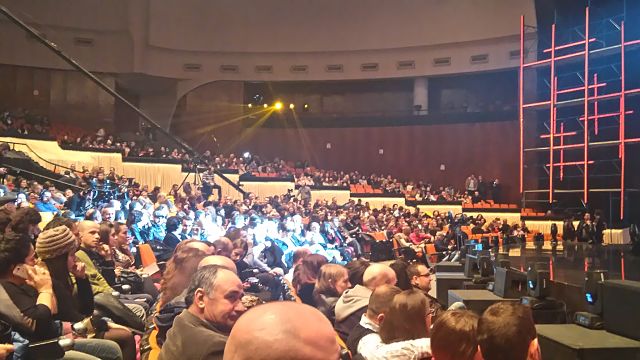
The Semi Final audience covered most of Albania’s age spectrum (Photo: Ben Robertson)
This similarity in feel to the Italian staple of song contest is not an accident. Albanian culture has been heavily influenced by Italy throughout most of the 20th century, with Albania close enough to Italy’s eastern coastline to receive their TV signals, and a common second language amongst older Albanians. The creation of Festivali i Këngës was quickly seized by the closed Communist regime to rival the offering from across the Adriatic and has a history all too sadly tied to the political control of the era; the 11th edition of the show resulted in all the organisers being killed by the governing bodies afterwards.
However true the comparisons to Sanremo are, with the greatest respect in the world it is clear we are walking into the cheap copy of Italy’s masterpiece of song with only a shade of the glitz and glamour. The venue, the Pallati i Kongreseve, was the location for annual Communist conventions and the seats come complete with folding side tables perfect for making notes at a lecture. The arena itself you would never know from the outside was hosting anything, never mind one of the annual highlights for Albanian broadcaster RTSH. Directly outside on Mother Teresa Square was a quaint Christmas market with grilled sausages and beer tents to enjoy in the t-shirt temperatures. Furthermore inside the venue the concourse was completely barren; no sponsors’ stalls, no bar, no food outlets and I didn’t dare ask about WiFi access. Some bubbles of razzmatazz did appear on Final night, namely in the sparkling wine the acts received in the hastily converted corridor of a Green Room, but Sanremo it certainly was not.
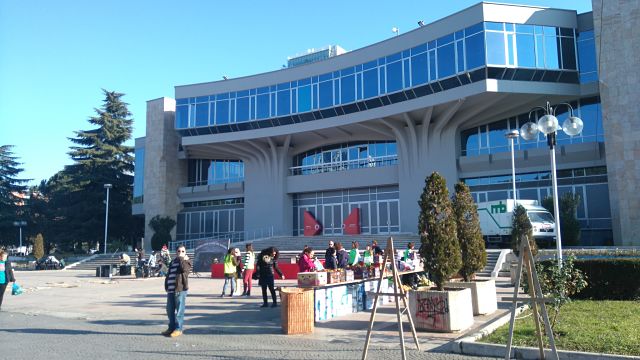
Lunchtime, Christmas Day, outside the main entrance to the Pallati i Kongreseve (Photo: Ben Robertson)
A Musical Front Of Old And New
The word tradition will come up repeatedly when you are looking at Albania’s thirty songs that get selected from the circa one hundred that are submitted each year. Close your eyes during the songs and you would not be mistaken for thinking you had transported back to a Eurovision selection from the 1980’s. The duets are heavy, dramatic and far away from the more predictable pop structures we hear today. The disco numbers feel lifted out of seedy back-alleys with a musical heritage most fathers would no longer admit to listening to. And the guitar solo has never felt as fresh and inspiring as here where every song seems to crowbar one in before the final chorus.
Part of this is because, like it’s counterpart Sanremo, there is a full orchestra for each of the act which must be used. The 60-piece ensemble surrounding the centre of the stage includes no woodwind section but at least four guitars and has a great impression on making the contest feel raw, emotional and far less fluffy than commercial pop can often be. Elton Deda, the Artistic Director for Festivali i Këngës, describes this as ‘setting a standard’ across the country.
“I love to sing with a live orchestra,” agrees Erga Halilaj speaking before she performed the reflective and serious ballad ‘Monolog’. “I am a pianist by profession and I love to perform live. It makes it be more near to the soul, you are more near to the music.”
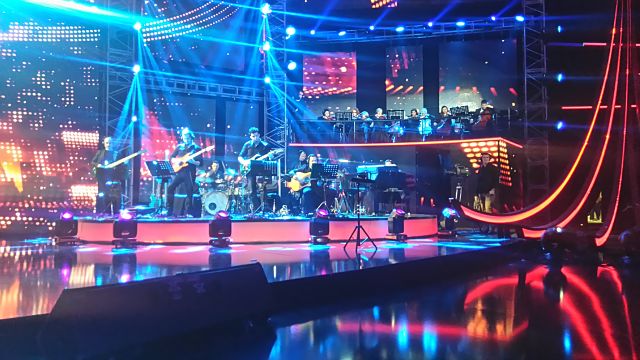
One half of the RTSH orchestra in full flight (Photo: Ben Robertson)
The closeness and intimacy an orchestra lifts Erga to be more at one with the performance, and it’s easy to sing praises about that passion translate watching live orchestra. Watching the show back online afterwards however, the power and passion the orchestra gave each song with barely resonated down the camera. Also, for all the soul the orchestra provides, it can take away a section of creativity.
From this year’s competition the key example of this effect was the song ‘>Liroje zemrën’, performed by Besa Krasniqi. Since a small child Besa has grown up in the middle of Sweden, moving with her parents as refugees from war-torn Kosovo. Starting up as an artist in fiercely-competitive Sweden, it was her father who found contacts with the Albanian broadcaster and opened the opportunity to her performance in the Final. Besa’s experience with the orchestra was more than wonderful, but it wasn’t what she really wanted.
“When I wrote my song I wrote it in a completely different way and I am a little sour about it [having to use the orchestra]. Now with the live orchestra not every sound can be played live, so I had to change the song a little bit to pass this competition. Now the sound is more classical, more acoustic. The original demo was more African styled, more electronic with a powerful beat.”
The use of the orchestra has held some artists back from unleashing their true self on the Festivali i Këngës stage. This show just sees itself as far too serious for electronic beats, backing dancers and the whole package of a ‘show’ Besa would have expected growing up alongside Sweden’s Melodifestivalen.
It’s not just the orchestra that limits artistic expression though. Another impact is that the voting system, 100% made up of a jury that sit all proper on the front row of the Pallati i Kongreseve. Performing to this bunch of middle-aged men sitting alongside younger females, performers put less emphasis into any idea of show and more to impressing the ladies and gentlemen with blasting vocals.
It’s something that Kristi Popa knew all too well, the music teacher who brought his adoring son Orion onto stage to open his performance by peering into a telescope. A big fan of Eurovision winner ‘Heroes’, Kristi’s plan was to include a huge projection of our galaxy sweeping across the screen as he serenaded the audience, and shared with me big ideas how the visuals and music would align. It goes without saying that this creative idea never came to light, even including his telescope prop really pushed the boundaries of what RTSH have ever done. The idea of entertaining through Festivali i Këngës seems new, and now a growing field of artists want their music to do far more and impress a wider audience than the front row of the Pallati.
Albania Has Hit Its Cultural Crossroads
After the Semi Finals I popped out to the sparse entrance foyer and interviewed some of the attendees as they were leaving the show. Many of them echoed each other, there was only one, or sometimes none, of the competing songs they actually enjoyed.
It’s no surprise. People were happy to take up free tickets from family members working for the TV station perhaps, but not particularly enthused about engaging with the Contest further. The hashtag #FiK54 was dominated by English speaking tweets from across the globe and the Albanian branch of OGAE doesn’t organise any festivities to coincide with their National Final.
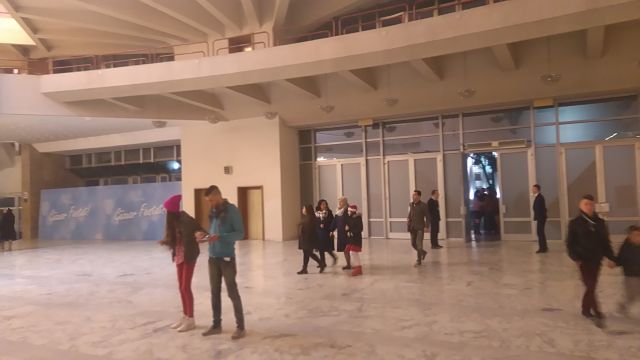
The main entrance way into the Pallati i Kongreseve before the Final (Photo: Ben Robertson)
The Albanian music scene is by no stretch of the imagination the backward and isolated cavern of classical culture a casual Festivali i Këngës viewer would potentially expect. Music channels and nightclubs across the country blend the same chart hits we’ve all been dancing to in 2015 alongside Albanian language equivalents, which are spot on the current musical trends.
A great example of this is from Aslajdon Zaimaj who spoke to me in the Green Room before being announced as the second place finisher. I put it to the 23-year-old performer with relatively edgy (by Festivali standards) song ‘Merrmë që sot’ that this Albanian competition was past its sell-by date. He agreed
“I think it is quite old-fashioned, and I am here to try and bring a bit of the new fashion. I would change this competition by putting in far more genres of music. Albanian pop music is really good and I used to live in Italy and we have to spread out cultures much more. Eurovision is a totally different thing [to this competition].
“Festivali I Këngës should be more like Eurovision. You should be more free to yourself and less restrictive and restrained.
“In Albania we had to be dressed like this because my mum will look at me. And if people don’t like my earring or my tattoos, it shouldn’t matter.”
People like Aslajdon are the next generation of fans, artists and producers of Festivali i Këngës, and they are the people who are needed to transform it into a new direction. When Albania came back into Eurovision in 2004, Aslajdon would not have even been a teenager. He would have grown up seeing Albania fare not-too-badly on the European stage, but wanting to grasp the huge opportunity it provides. The carrot of Eurovision even kept up interest in the Festivali i Këngës format against the rival show Kënga Magjike, but as the latter looks more and more like the TV entertainment Eurovision has transformed into, Festivali i Këngës is stuck in its ways (‘trendy music’ was how Elton Deda, the contest’s Artistic Director, described Eurovision’s recent progression) . The old-fashioned roots of Festivali i Këngës are successful in their own niche way, but that is alienating too many of the good musicians, songwriters and artists Albania produces to be truly effective.
Albania’s Eurovision participation has hit a cultural crossroads. There is a strong sense of nostalgia that Festivali i Këngës provides Albanian TV and a demographic that has grown up with their domestic competition in this classical concert setting. However there is a growing body of the musical population across Albania who want more from Eurovision and Festivali i Këngës than just a chance to celebrate and to showcase their culture; now they want to join in and compete with Europe at their own game.
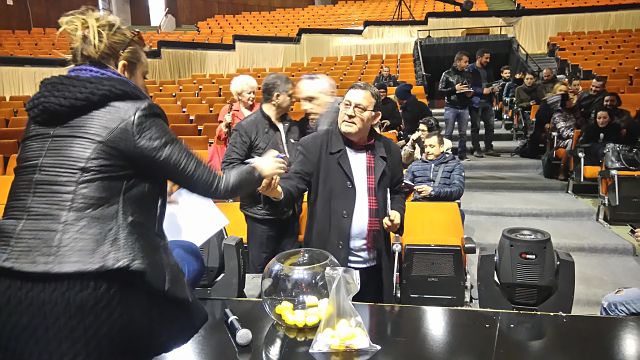
For the upteenth time in his career, Kozma Dushi draws his running order position on the morning of the Final (Photo: Ben Robertson)
Where Next for Festivali?
In the Pallati i Kongreseve on Final night, the parallel cultures of the show were clear to see. The audience came from every age range possible, with families, youngsters on iPhones taking a gazillion selfies and older people who probably could recite the track lists of the 1st edition. It was a huge demographic, but with very different cultures of what to expect. The older audience clapped politely after each song, and stayed glued to their comfy chairs throughout the seeming eternity of the live production. The younger fans cheered, whooped, moved around during the breaks and had a behaviour commonplace to a Eurovision show, but drawing a fair handful of scowls from the older ladies in-front.
It’s clear to me that if Festivali i Këngës stays fully true to its current format it will move further and further away from the movement that Eurovision goes in. Sometimes those cultures may hit the bullseye, as Rona Nishliu arguably nailed with ‘Suus’, but those moments of success will get rarer. There are many ways it could progress, and not one of them is correct. Perhaps it could be a small yet important addition of televoting, to increase engagement with the TV audience at home. Perhaps allowing for some songs to be played on a backing track, or to have dancers, or heaven forbid to sing in English, would ease the competition towards a more youthful roster of artists and musicians. Perhaps it needs a whole new show, but this would lose lots of the magic and national pride that does come in Festivali i Këngës.
Albania’s selection process has made small steps to slowly modernise their selection process in recent years. For example an Italian production company now produce a modern show complete with LED screens and this year the broadcaster commissioned music videos for each song before the contest. Progress and change is already happening but it needs to continue. The next generation of Albanian artists more than ever want to utilise the international platform Eurovision can provide. The last they need is a competition format limiting widespread appeal, rather than being the springboard to success. It’s hardly a surprise that, after composer squabbles lead to Elhaida Dani needing a new song for Eurovision post-victory in last year’s Final, the new song was far more European pop than Albanian artistry.
At the smoke-filled after show party in Tirana’s Blloku district (featuring a very random token Eurovision song on the playlist) this younger generation were partying well into the early hours getting mighty drunk on the free wine. You couldn’t wipe the smile off Aslajdon’s face all evening, delighted with his second place result. This generation are confident Albania’s broadcaster RTSH will drag itself through the rough to make a brand of their National Final more relevant for the future. It has to in order to survive at the forefront of Albanian culture.










There is no point in getting use to the song as selected by Albania. By the time of submit ion in March it will be rearranged, shortened to 3 minutes, have new English lyrics and will sound completely different from what it sounded when chosen(and there is always the chance that whole song will changed-see 2015).
Did it ever worked for them?no.So what’s the point.In most cases they work the song too much it loose its appeal.
I appreciate their efforts to keep their cultural heritage, but maybe they need to think if Festivali i Këngës is the right platform to choose a Eurovision song.
It will be nice to hear an Albanian song sounding as it it was when chosen,some minor chnages are welcome a complete overhaul is a bit too much
Interesting article Ben! Albania are a solid midfield player for me these days – if nothing else, FiK’s focus on live performance usually turns out singers who can handle the pressures of the Eurovision stage, and their willingness to polish their entries usually results in a final-worthy package.
Unfortunately, they’re not a country I see as a potential winner in the future, because the songs always seem to lack that international spark. Hence their comfort zone seems to be 16-17th (where 5/7 of their qualifiers have ended up!).
Of course, winning isn’t everything. I wonder if the financial burden of hosting the contest is something they’d even welcome at this moment in time. But I would like to see them step up a gear, and it does feel like they might need to separate their Eurovision aspirations from FiK to achieve it. But are the two traditions already too intertwined in the eyes of the audience?
Maybe they could do what San Remo did for a few years, and separate the responsibility of going to Eurovision from the Grand Prize – using a different (younger!) jury to make that call based more on the studio versions than the live arrangements?
Totally agree. Kenga Magijke is Albania’s best bet for a more modern, polished song (IMO). Based off the 2015 edition’s songs alone, they could be contending for the final- Aurela Gace won with a stunning song, and several others are high-quality and Europe-ready.
Aurela’s song (released after September!) : https://www.youtube.com/watch?v=ZH5vbnfeU_U
Albania (and the rest of the Balkans) have the potential to win again, but a combination of outdated selections and missed opportunities are setting them back.
As I was the first to stump Albania’s efforts in the past, it is up to me also to give them credit when credit due.
In 2018 they actually did everything right. They kept it in Albanian, they kept the song mostly as it was and the Eurovision version didn’t destroy the song but just made a long song shorter without harming it. The bottom line, they had a good result in Lisbon.
From what I read, they added a night, where each song will be presented in its Eurovision version, which make sense.
I think they are on the right track.
Time will tell if 2018 was a turning point for Albania or was it just an exception to the Albanian rule in the book of Eurovision.